One of the highlights of our recent book, Remodelista in Maine? The island home of architect couple Maria Berman and Brad Horn. Thumb through and you’ll see it perched on a cliff on the Maine island of Vinalhaven, its shell one of architectural brilliance: a modern, über pared-down version of a quintessential New England farmhouse, its two sides joined by a spacious screen porch. But the house never takes itself too seriously, either. Inside, it’s all easy-going materials, riotous color and pattern, and mismatched finds from unlikely sources: thrift stores, estate sales, even—memorably—the swap shop at the Vinalhaven dump.
So when Maria and Brad emailed us with shots of their place in New York City, where their firm, Berman Horn Studio, is based, we were delighted to note their characteristic approach applies just as effortlessly to a historic Harlem row house, with an architect’s sense for structure and flow and a collector’s irreverent mix of finds.
“It’s a turn-of-the-century row house that was built when the new subway system began to link upper Manhattan to downtown,” Maria writes of their place. “In the nineteenth century the area was very rural, with small frame houses. The subway system made it part of the city.
“We found this place when we finished architecture school in upper Manhattan. We had been living in a really raw loft space behind the old Fairway market in the Harlem meatpacking area and wanted something that was more stable and secure. We also loved the area and felt it was a community we wanted to be a part of.”
The couple inherited the house’s historic bones and made subtle, smart updates that almost blend into the background. But like the oft-quoted notion that design, done well, is invisible, the effect is evident: in a potentially awkward layout unified by a single paint color and a so-efficient-you-might-miss-it kitchen space. “In a way, not feeling obligated to restore historic interiors allowed us more freedom in terms of finding a layout and aesthetic identity that worked for us,” Maria writes.
Join us for a walk through.
Photography by Greta Rybus.
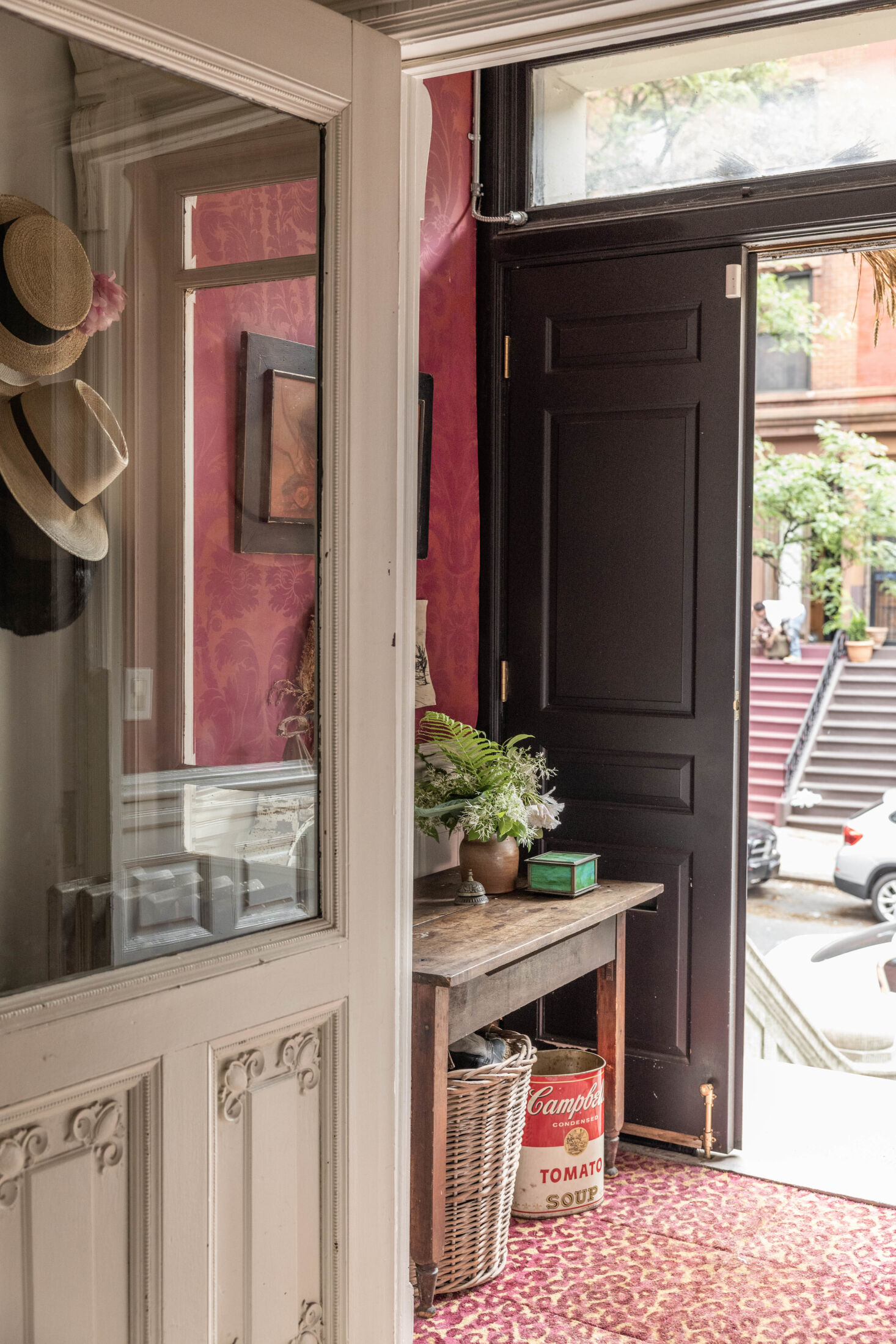 Above: The entryway sets the tone immediately: This is a house with a sense of play (and a sense of humor). “This entry really speaks to our approach of creating effortless interiors: vintage finds coupled with a tiny moment of hot pink grandeur,” Maria writes. The Campbell’s tomato soup can is a flea market find; the carpet is a remnant of a pink leopard-print design.
Above: The entryway sets the tone immediately: This is a house with a sense of play (and a sense of humor). “This entry really speaks to our approach of creating effortless interiors: vintage finds coupled with a tiny moment of hot pink grandeur,” Maria writes. The Campbell’s tomato soup can is a flea market find; the carpet is a remnant of a pink leopard-print design.
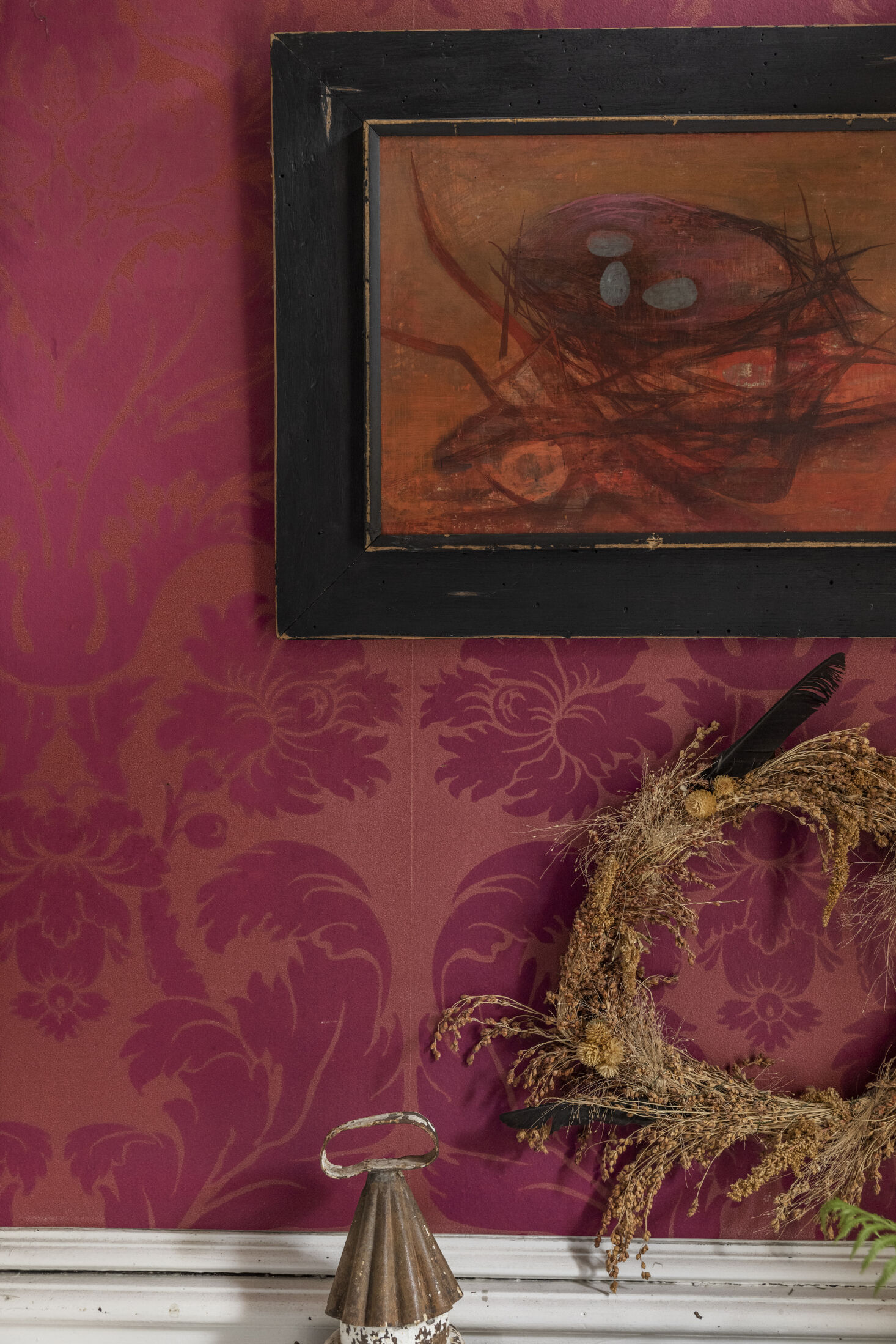 Above: “The pink wallpaper was a close-out from a million years ago that waited for its moment to shine,” Maria adds. “When the sun hits it, the little entry floods with a pink glow. Hard to be unhappy with that.”
Above: “The pink wallpaper was a close-out from a million years ago that waited for its moment to shine,” Maria adds. “When the sun hits it, the little entry floods with a pink glow. Hard to be unhappy with that.”
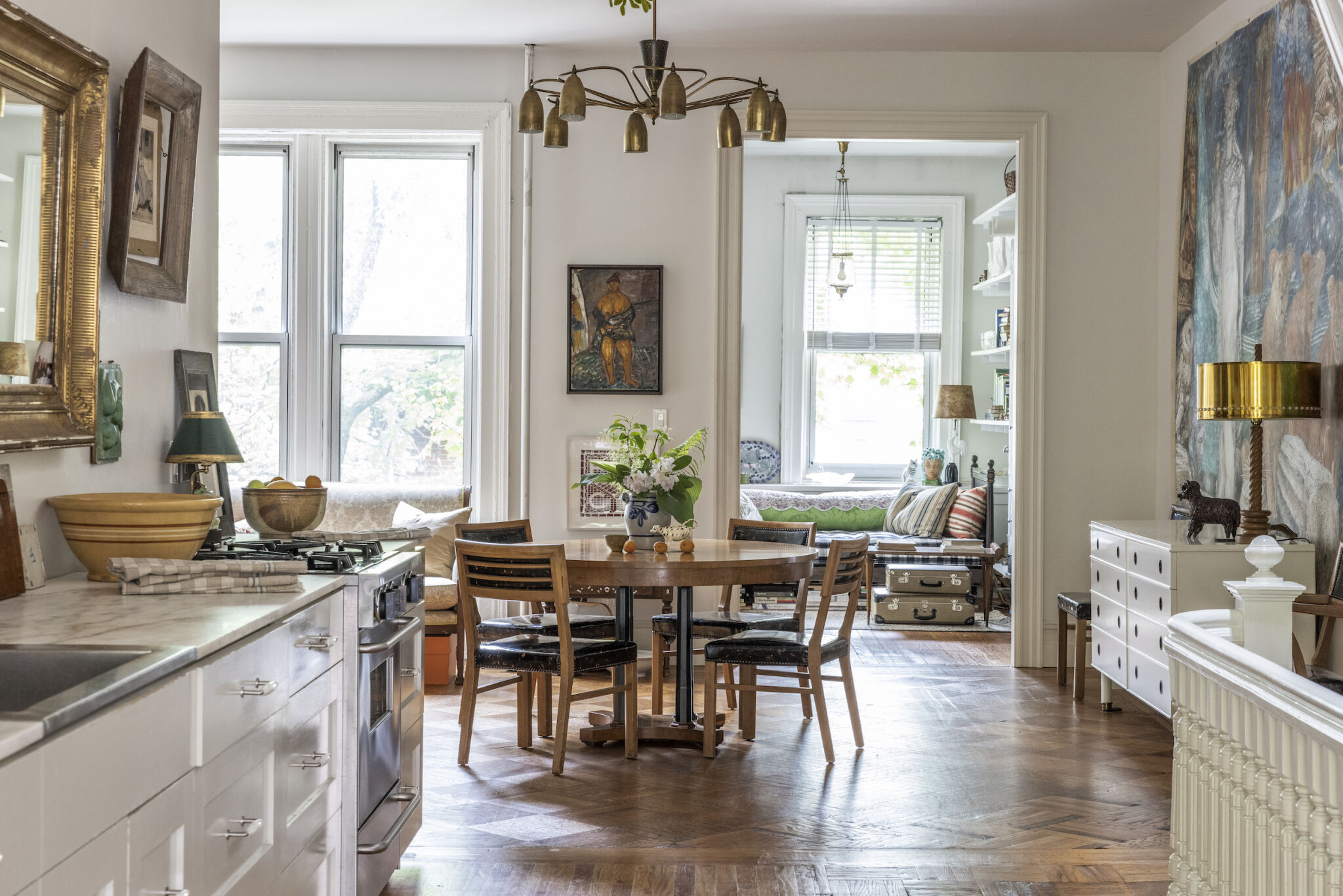 Above: “This house had lost many of its historical details through the years, but we were lucky to still have the beautiful parquet floors, grand staircase, and overall bones of the space with its tall ceilings and beautiful southern light,” Maria writes.
Above: “This house had lost many of its historical details through the years, but we were lucky to still have the beautiful parquet floors, grand staircase, and overall bones of the space with its tall ceilings and beautiful southern light,” Maria writes.
“We like to gather friends and family together and live pretty informally, with a preference for large open spaces rather than many individual rooms. We did all we could within the structural confines of the house to create long views and openness. This is especially true of the living/dining/kitchen floor. All the rooms flow together. While that’s not how this house would have been originally used, we feel it really celebrates the beautiful scale and proportions of the spaces.”
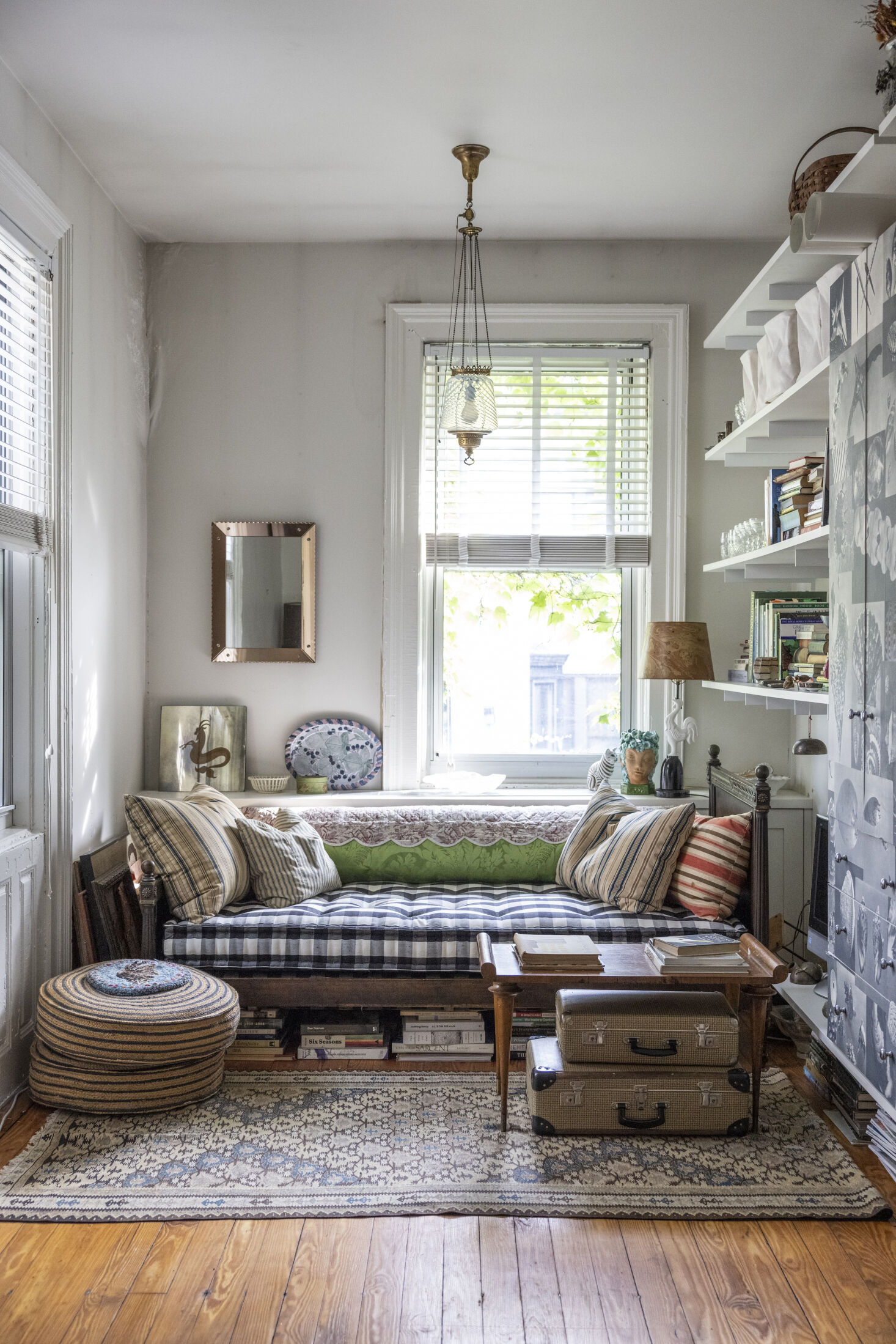 Above: The couple maximized a tight nook with a daybed (“another flea market find”) and built-in shelving.
Above: The couple maximized a tight nook with a daybed (“another flea market find”) and built-in shelving.
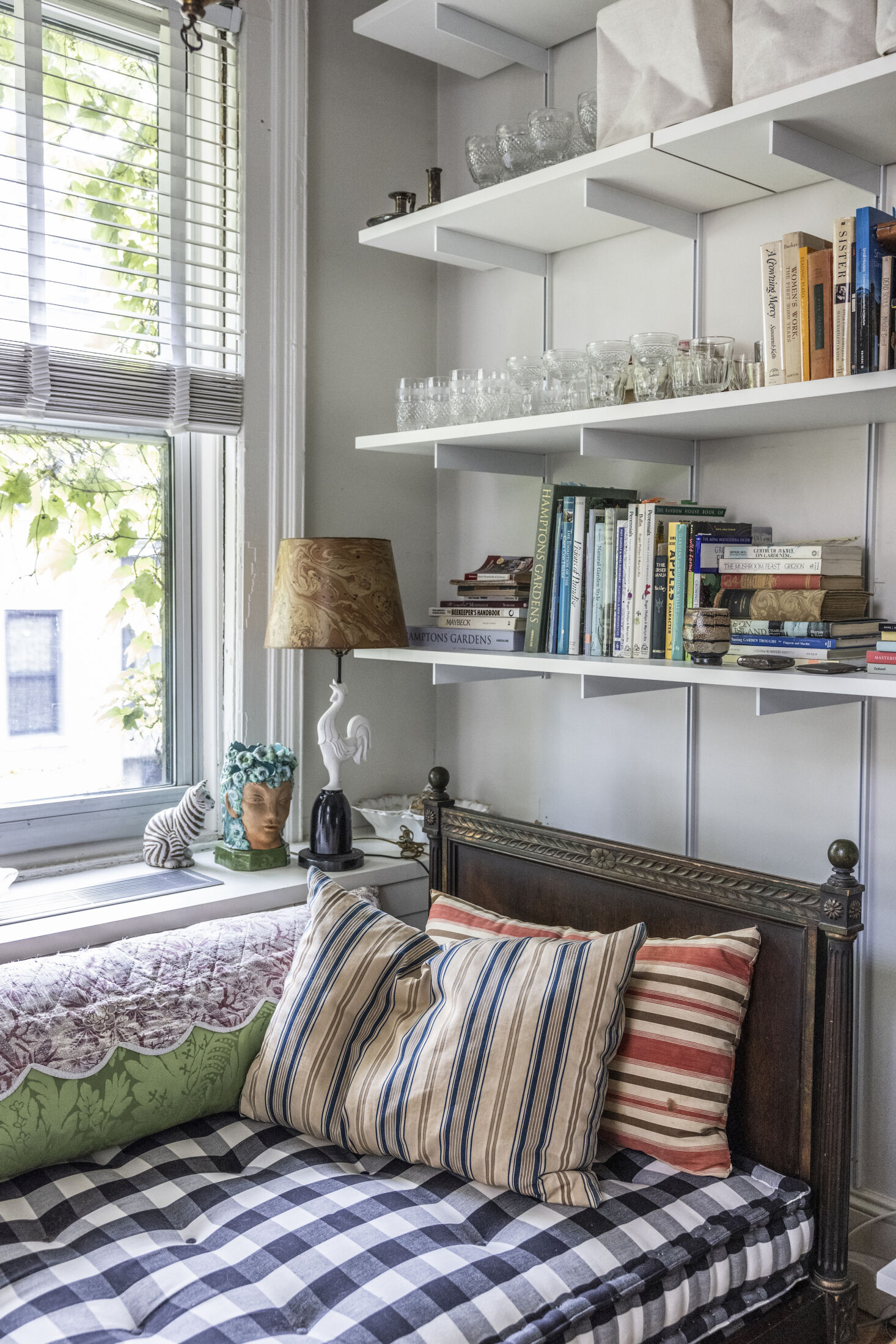 Above: “I have a weakness for vintage ticking pillows, and every time I find one it gets added to this pile,” Maria writes. “They’re all different but magically look great together.”
Above: “I have a weakness for vintage ticking pillows, and every time I find one it gets added to this pile,” Maria writes. “They’re all different but magically look great together.”
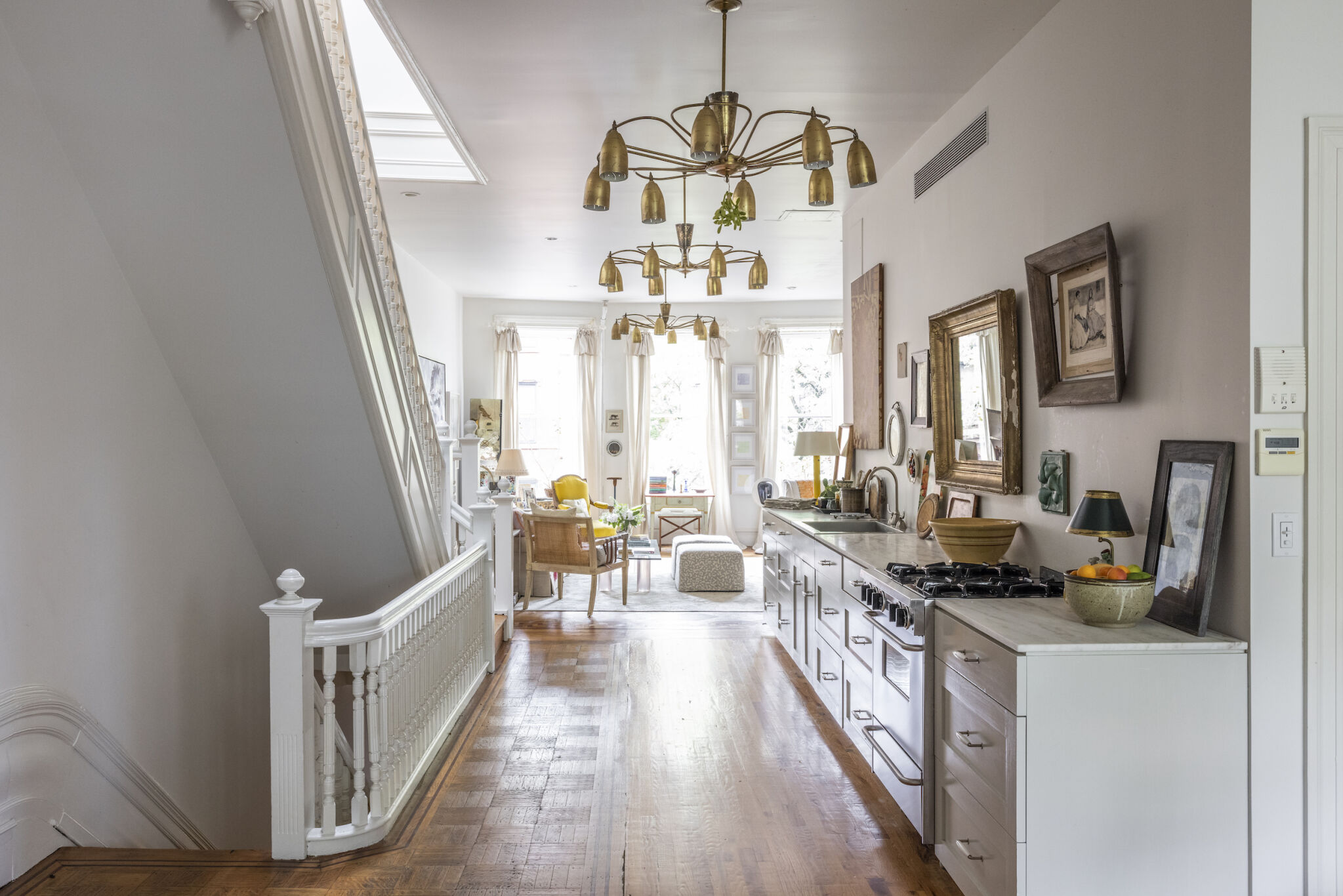 Above: In a genius move, the kitchen spans the pass-through space between dining area and living area. “New York City row houses tend to be long and skinny, like a dumbbell shape, with the stairs and narrower, darker spaces in the middle,” says Maria. “We decided to place the kitchen along this narrow part as a way to link the living and dining areas. We all know that a kitchen draws people in like a magnet, and we wanted to create a space that encouraged people to flow through it. Many kitchens are tight or have dead-end corners, and we imagined one that was the opposite of that.”
Above: In a genius move, the kitchen spans the pass-through space between dining area and living area. “New York City row houses tend to be long and skinny, like a dumbbell shape, with the stairs and narrower, darker spaces in the middle,” says Maria. “We decided to place the kitchen along this narrow part as a way to link the living and dining areas. We all know that a kitchen draws people in like a magnet, and we wanted to create a space that encouraged people to flow through it. Many kitchens are tight or have dead-end corners, and we imagined one that was the opposite of that.”
The kitchen is both in the middle of everything and also, in a way, so unobtrusive it’s barely noticeable. “We’ve had people over for dinner who ask us where the kitchen is, and they’ve been standing around it the whole night,” adds Maria.
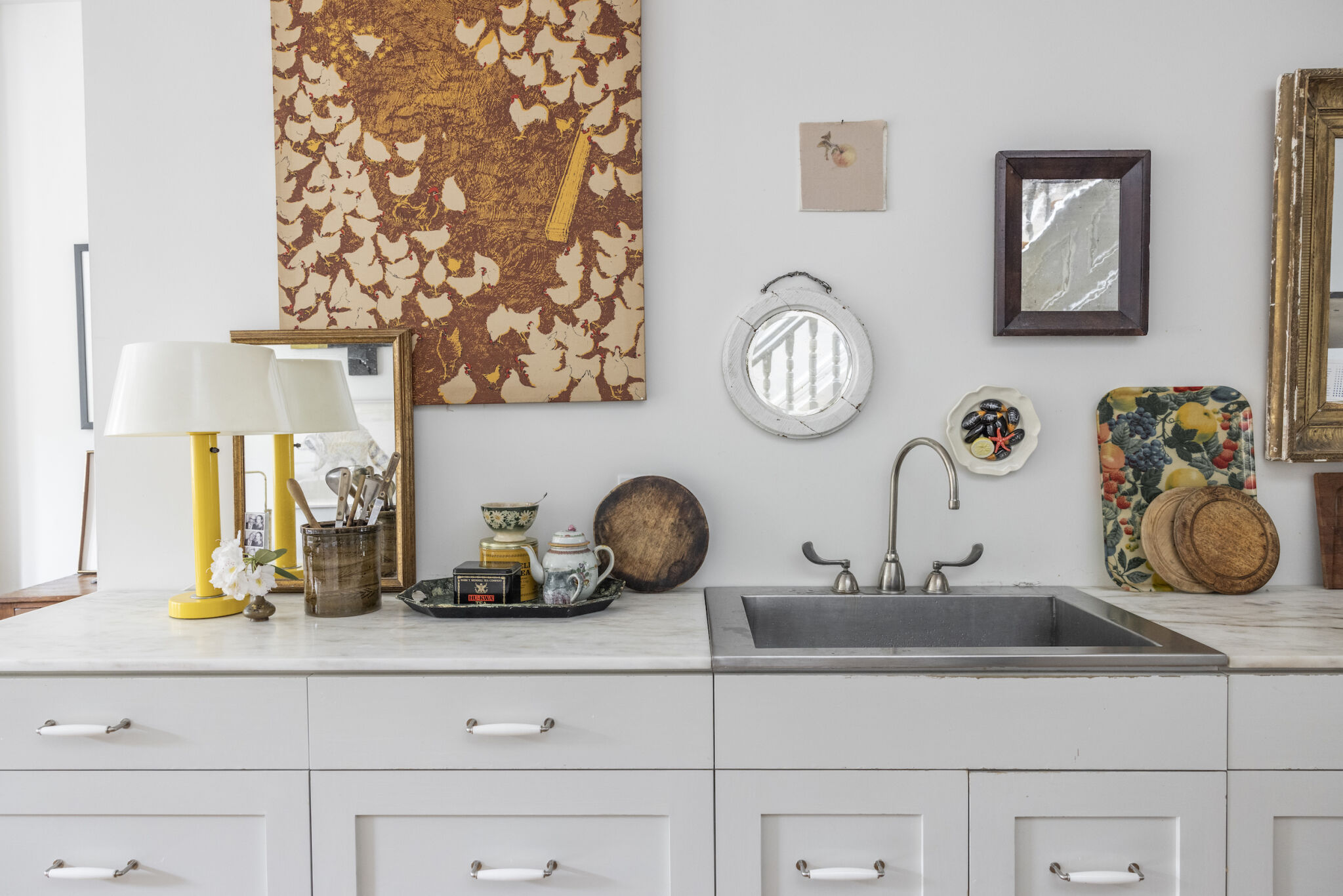 Above: The kitchen features a stainless-steel sink with a wide, flat lip: “We had this custom made by restaurant supply folks,” Maria writes.
Above: The kitchen features a stainless-steel sink with a wide, flat lip: “We had this custom made by restaurant supply folks,” Maria writes.
Maria and Brad use the long counter for cooking and also as a bar and serving area for entertaining: “It naturally gathers people together but doesn’t create logjams,” writes Maria. “We also wanted it to feel almost like a piece of furniture, so there are no upper cabinets but instead a rotating display of art and mirrors.” As for the fridge and dishwasher? “Those live in a pantry behind the kitchen, which is a really useful ‘back of house’ space. Overall the vibe is more of a stealth kitchen rather than a dramatic, opulent space.”
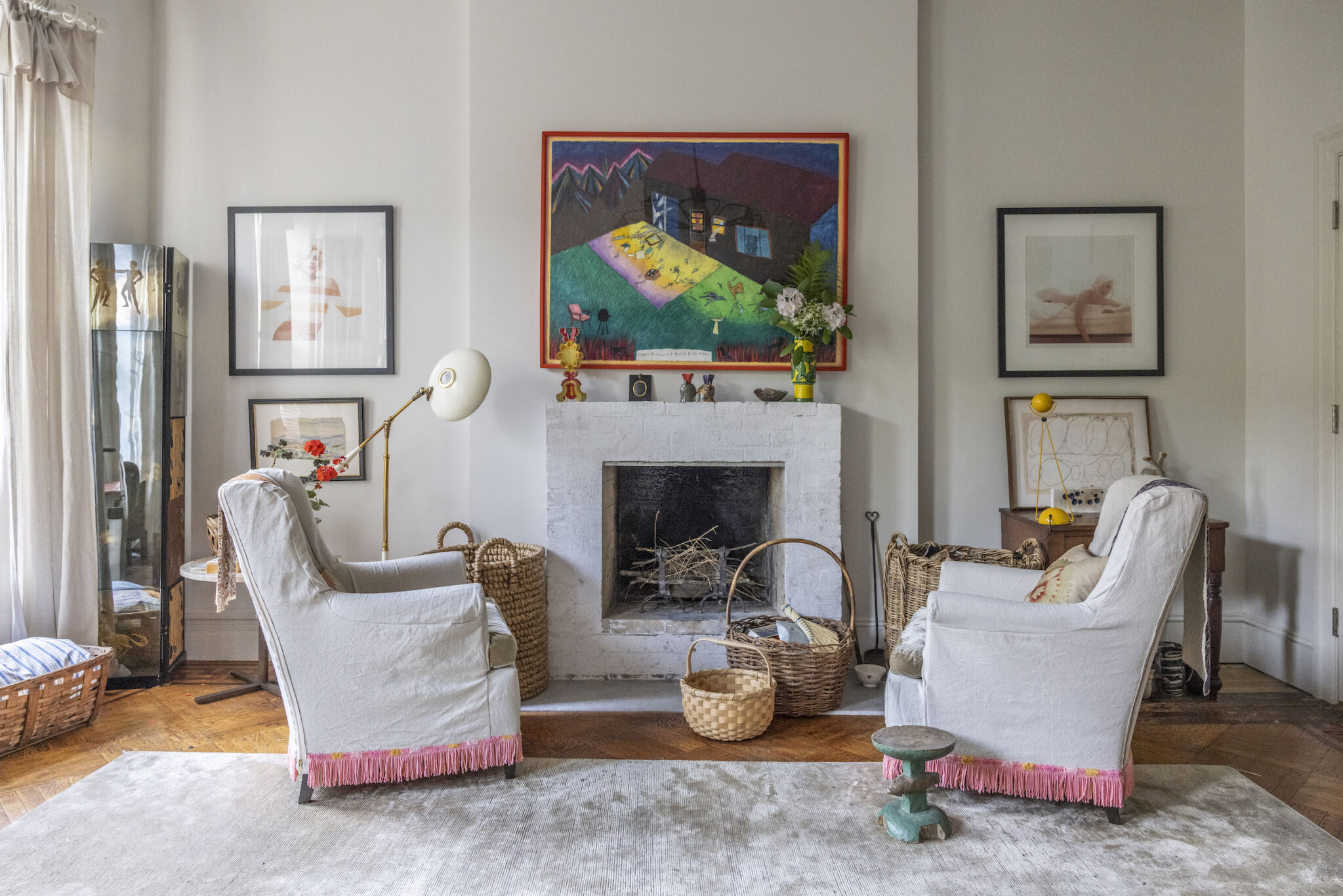 Above: In the eclectic living area, pink-fringed armchairs and an assortment of vintage baskets flank the fireplace.
Above: In the eclectic living area, pink-fringed armchairs and an assortment of vintage baskets flank the fireplace.
“These chairs were a pandemic project; I taught myself how to make slipcovers during lockdown,” says Maria. “They’re covered in heavy drop cloth fabric, and the pink fringe is salvaged from vintage chenille bedspreads. I couldn’t find a fringe that was both silly and bright pink enough until I found a person who sold this stuff on Etsy. It was incredibly therapeutic to work on this project during a time when everything was so unknown and terrifying.” (The chairs also happen to be a marriage of two things we love: drop cloth transformations and fringe-bottom chairs.)
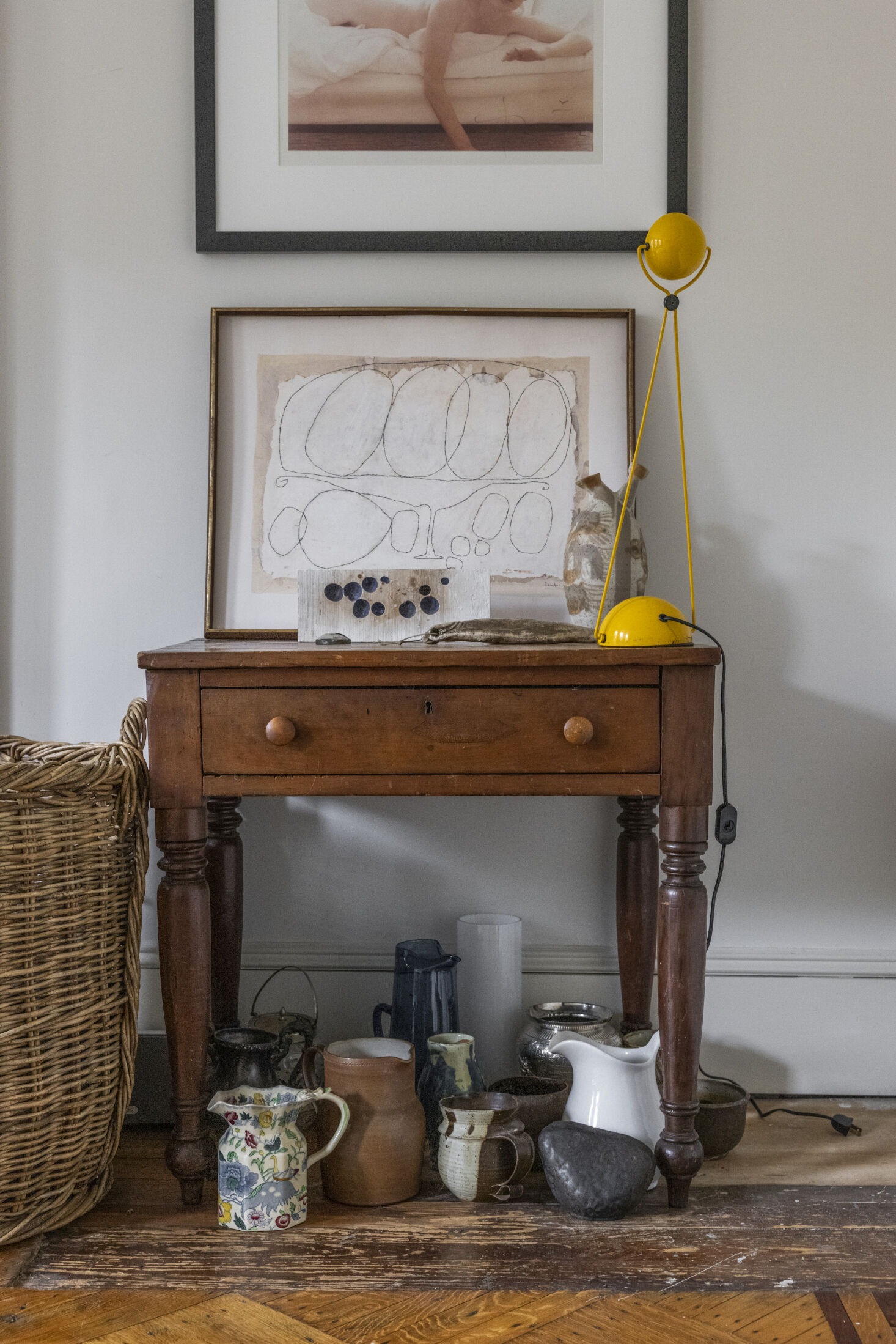 Above: Found jars assemble under a side table.
Above: Found jars assemble under a side table.
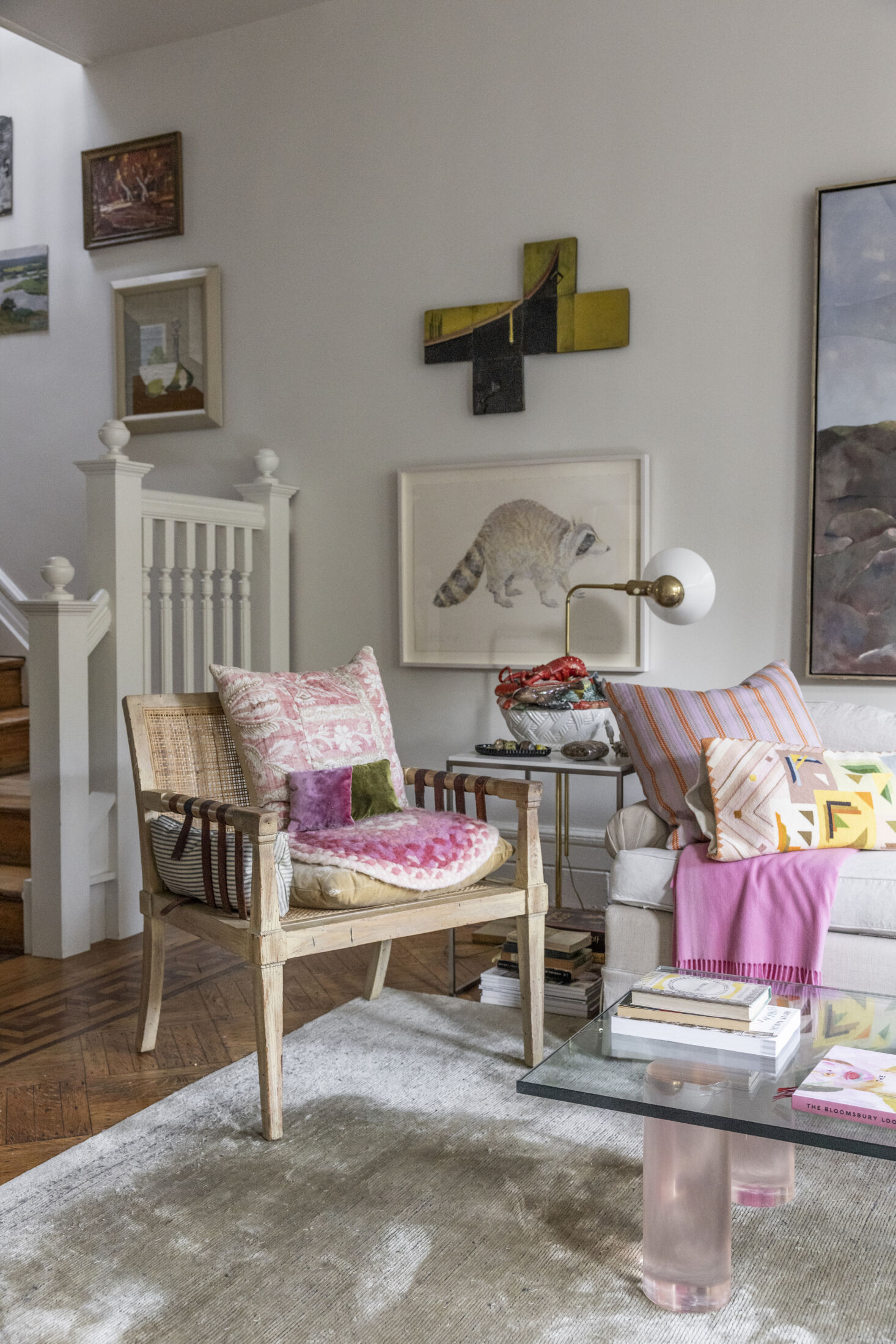 Above: “The entire house is painted Benjamin Moore Seapearl,” Maria notes. “It’s an off-white that’s neither too warm nor too cool. It’s just feels like a perfectly weathered-in background and looks just right through the changing light of the seasons.”
Above: “The entire house is painted Benjamin Moore Seapearl,” Maria notes. “It’s an off-white that’s neither too warm nor too cool. It’s just feels like a perfectly weathered-in background and looks just right through the changing light of the seasons.”
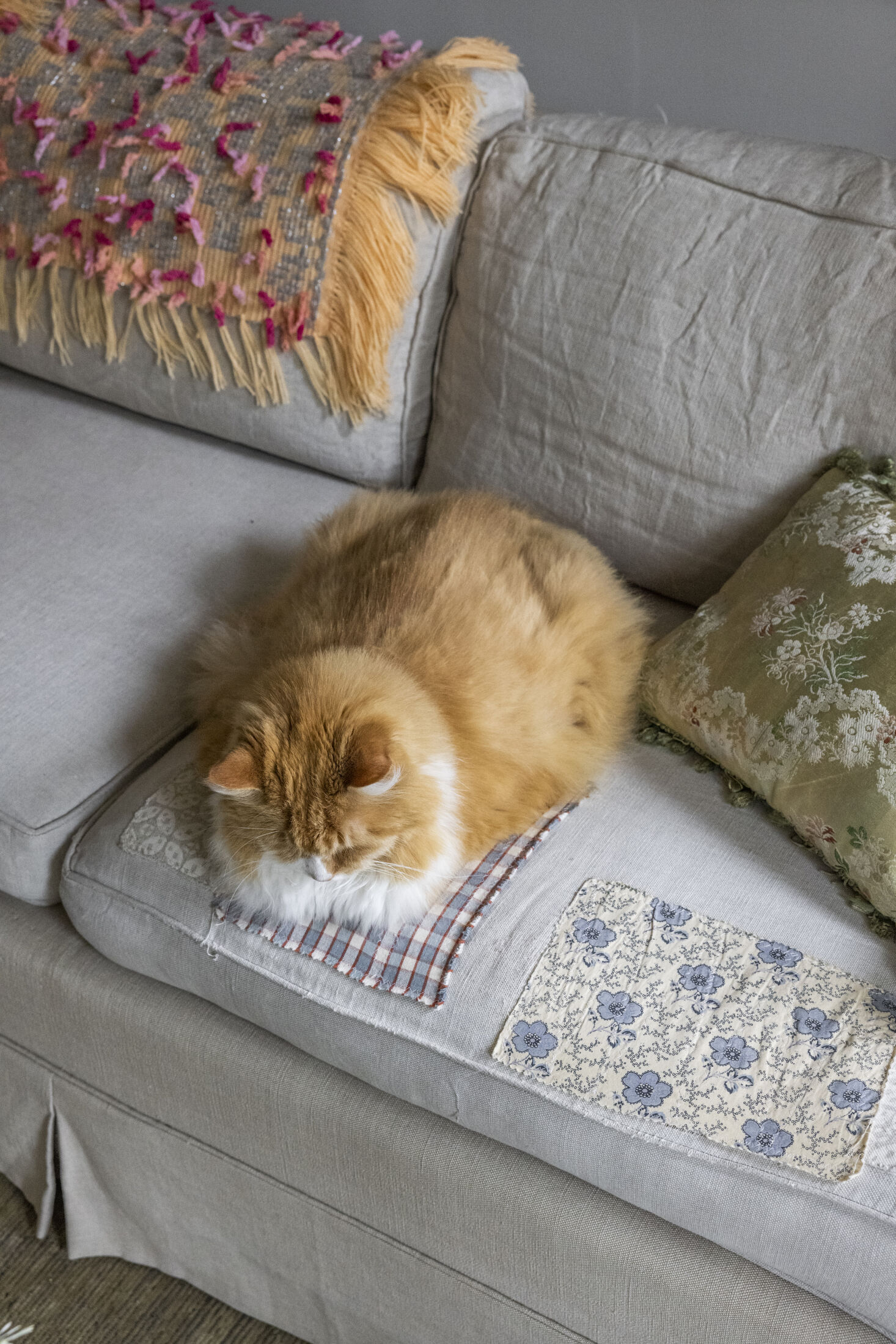 Above: The couple’s cat, Sandor, dozes on his perch of choice. “He cannot be kept out of a photograph,” Maria says. Look for his cameo in Remodelista in Maine, too (he’s on page 35).
Above: The couple’s cat, Sandor, dozes on his perch of choice. “He cannot be kept out of a photograph,” Maria says. Look for his cameo in Remodelista in Maine, too (he’s on page 35).
Of the patched sofa, Maria writes: “Clearly one of the cushions get more use than the rest, and the couch fabric started to wear through. The fabric was discontinued, and it seemed wasteful to recover the entire couch because of one cushion. I’ve embraced the art of mending to create these patched repairs. They’re silly and not too serious but also cheerful and thrifty.”
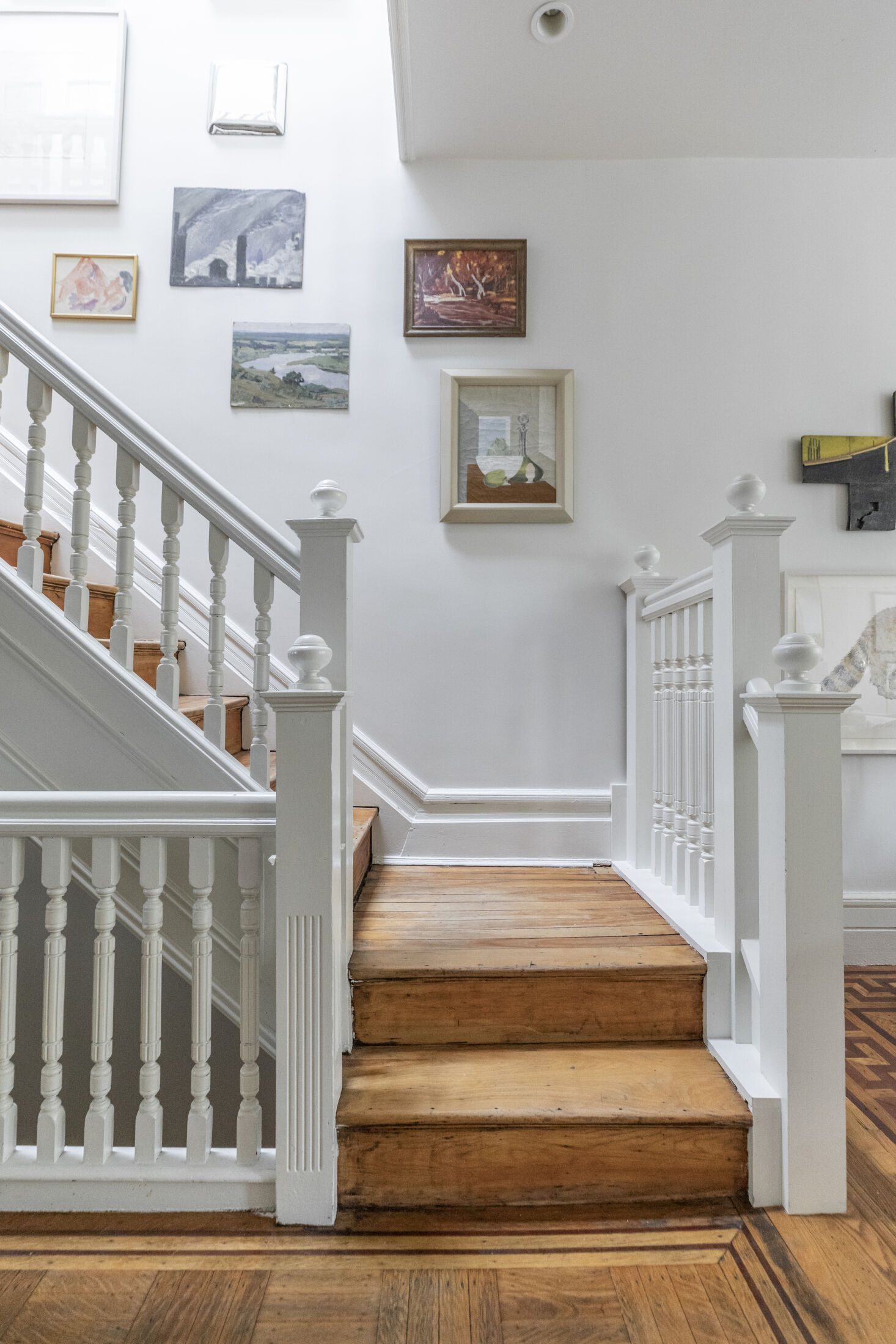 Above: The house’s central stair was preserved through the years. “Because there was little cohesion, we decided to paint everything, which became a subtle backdrop to how the spaces work today,” Maria writes.
Above: The house’s central stair was preserved through the years. “Because there was little cohesion, we decided to paint everything, which became a subtle backdrop to how the spaces work today,” Maria writes.
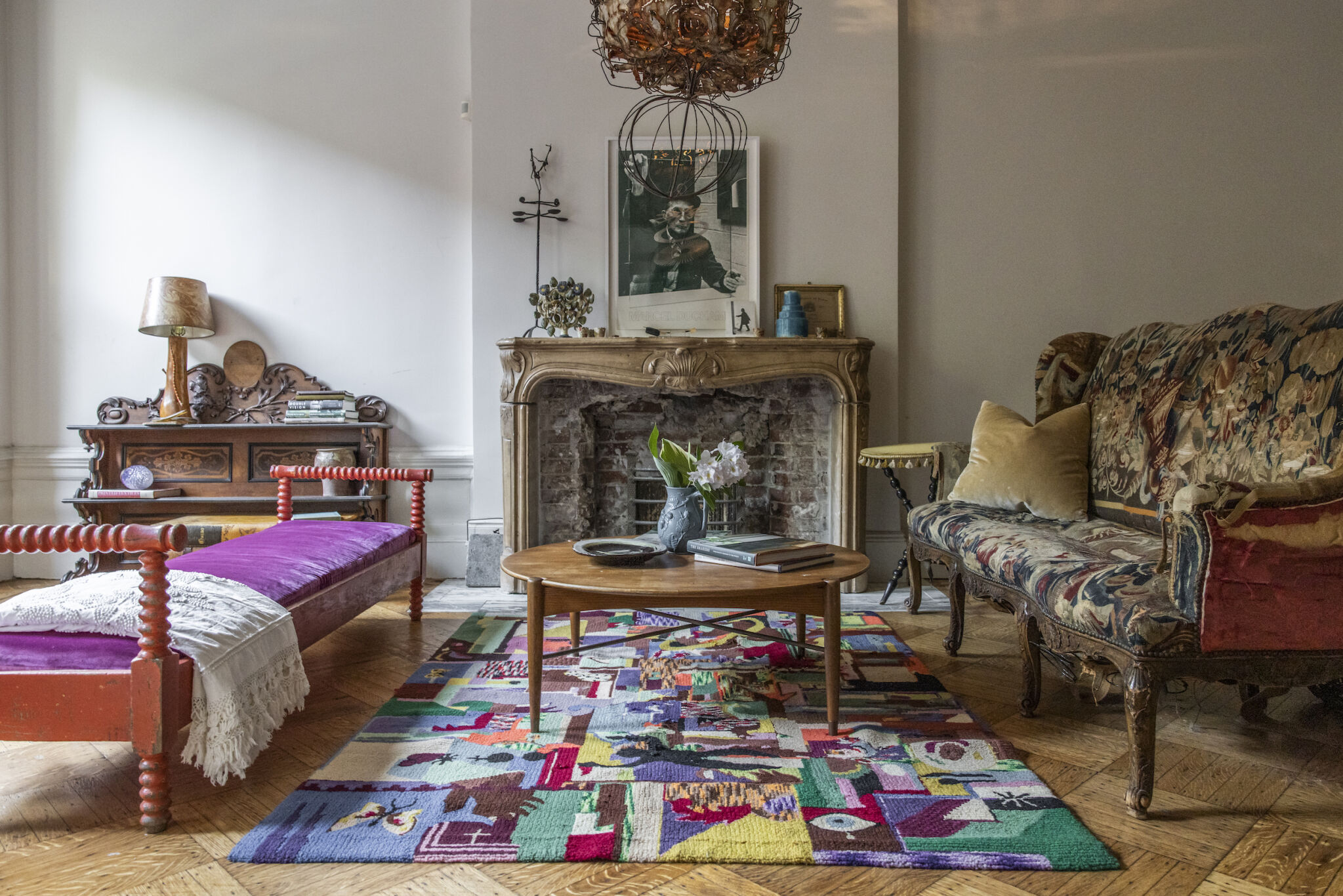 Above: On another floor, a living area is a wild but curated mix of color, pattern, and provenance. “The red daybed is early American, found at a flea market. I love the juxtaposition with the hot pink velvet seat,” writes Maria. “The sofa is French with a very old and bedraggled verdure tapestry. It’s pretty much a ruin, but I don’t have the heart to recover it just because it’s so glorious in its deterioration.”
Above: On another floor, a living area is a wild but curated mix of color, pattern, and provenance. “The red daybed is early American, found at a flea market. I love the juxtaposition with the hot pink velvet seat,” writes Maria. “The sofa is French with a very old and bedraggled verdure tapestry. It’s pretty much a ruin, but I don’t have the heart to recover it just because it’s so glorious in its deterioration.”
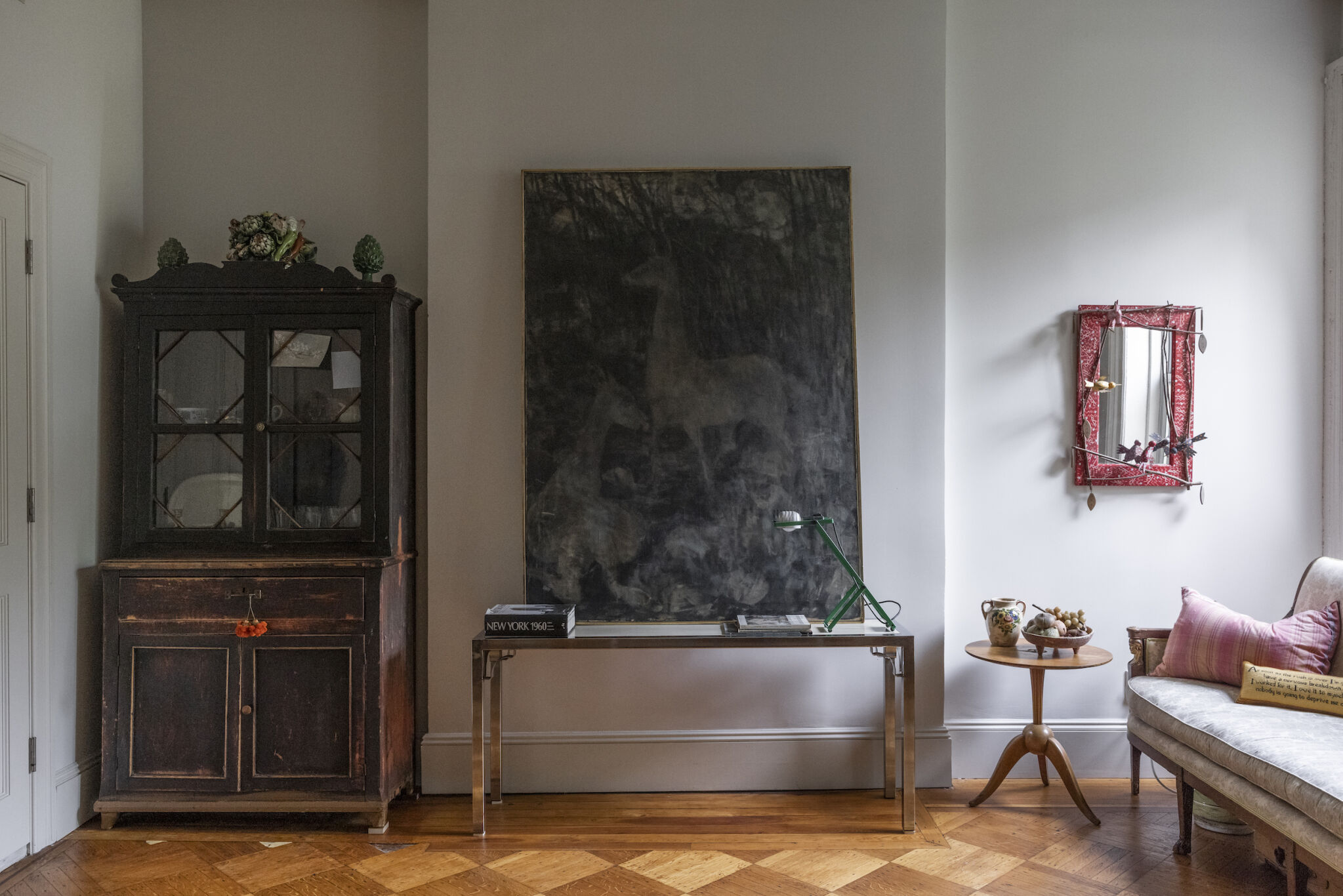 Above: On another wall, a wonky glass-fronted cabinet cohabitates with a large-scale painting by Sarai Sherman. “She was a NYC-based painter and exhibited widely through the 1950s and 1960s,” writes Maria. “I saw it in the window of a thrift store and was drawn to its moodiness and how she portrayed the relationship between people and nature. I’m both curious and saddened by the trajectory of so many incredible artists who had thriving careers that are now forgotten.”
Above: On another wall, a wonky glass-fronted cabinet cohabitates with a large-scale painting by Sarai Sherman. “She was a NYC-based painter and exhibited widely through the 1950s and 1960s,” writes Maria. “I saw it in the window of a thrift store and was drawn to its moodiness and how she portrayed the relationship between people and nature. I’m both curious and saddened by the trajectory of so many incredible artists who had thriving careers that are now forgotten.”
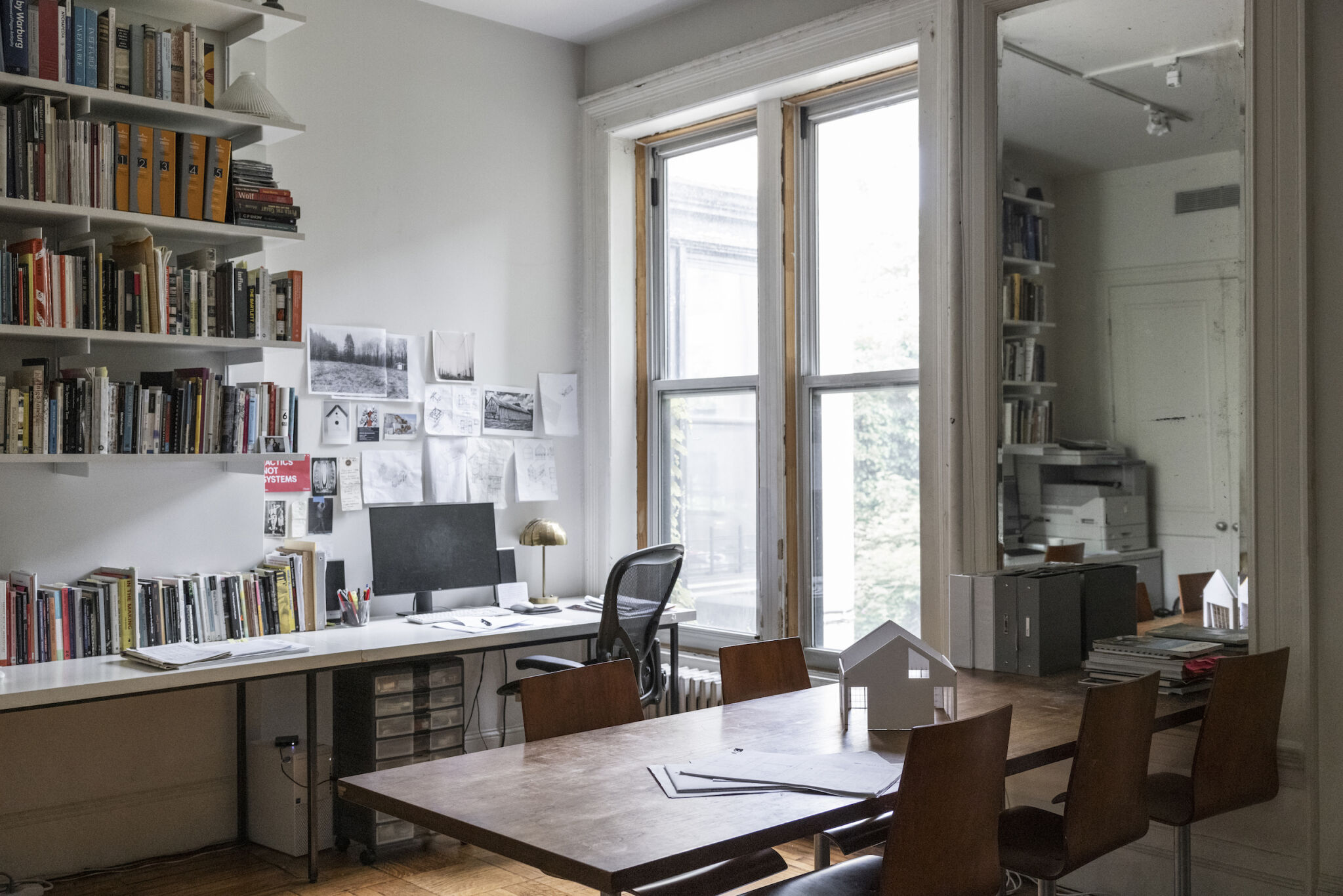 Above: “We share a large room as our home office space,” says Maria. “It’s where we have more private inspirational work time.”
Above: “We share a large room as our home office space,” says Maria. “It’s where we have more private inspirational work time.”
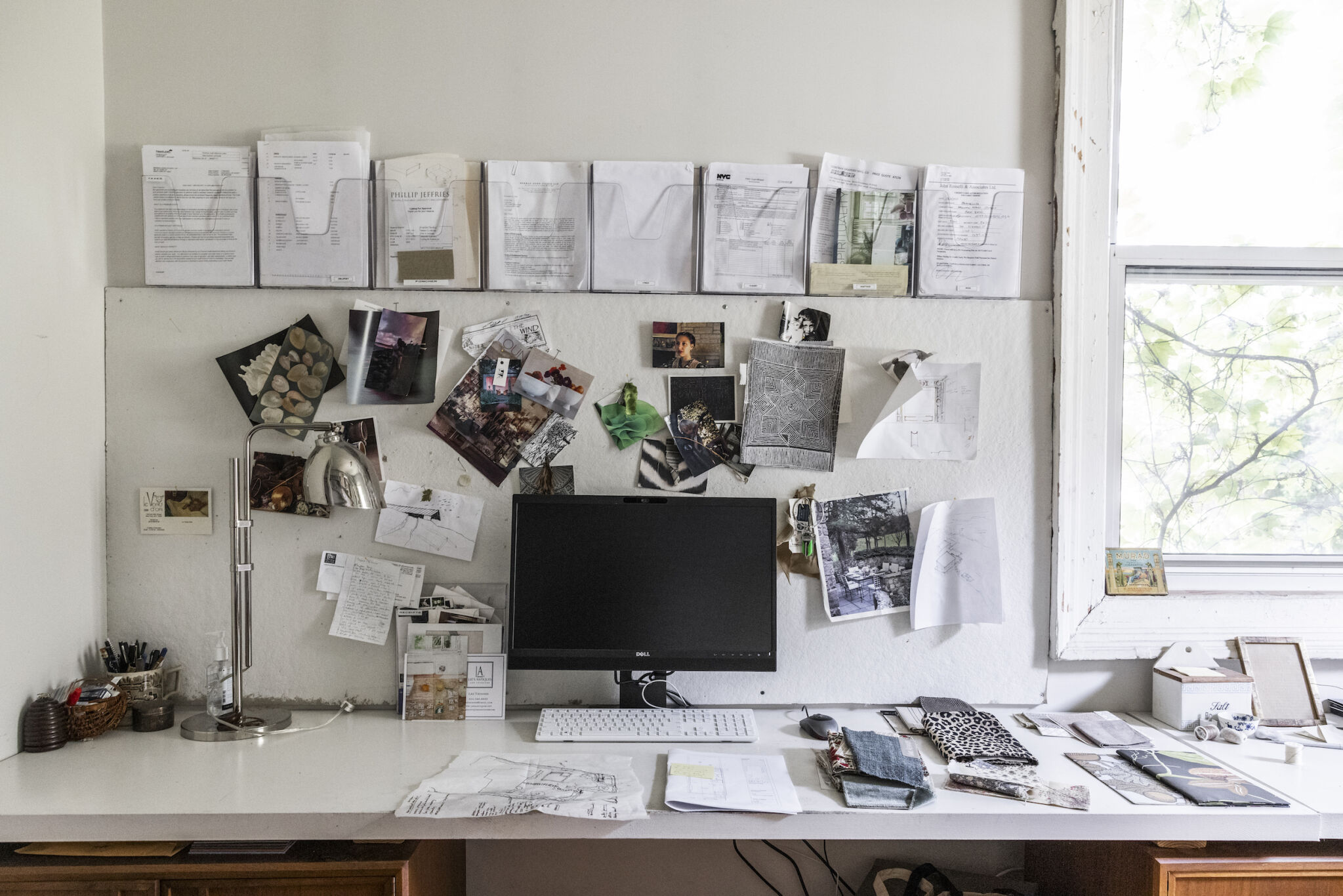 Above: The couple has worked to create a pleasantly tactile, analog home office. “We’re really visual people, so each of us has lots of inspiration pinned up or just hanging out on our desks,” Maria writes. “It’s fundamentally different to look at these things in real life than just scrolling through them on a device.”
Above: The couple has worked to create a pleasantly tactile, analog home office. “We’re really visual people, so each of us has lots of inspiration pinned up or just hanging out on our desks,” Maria writes. “It’s fundamentally different to look at these things in real life than just scrolling through them on a device.”
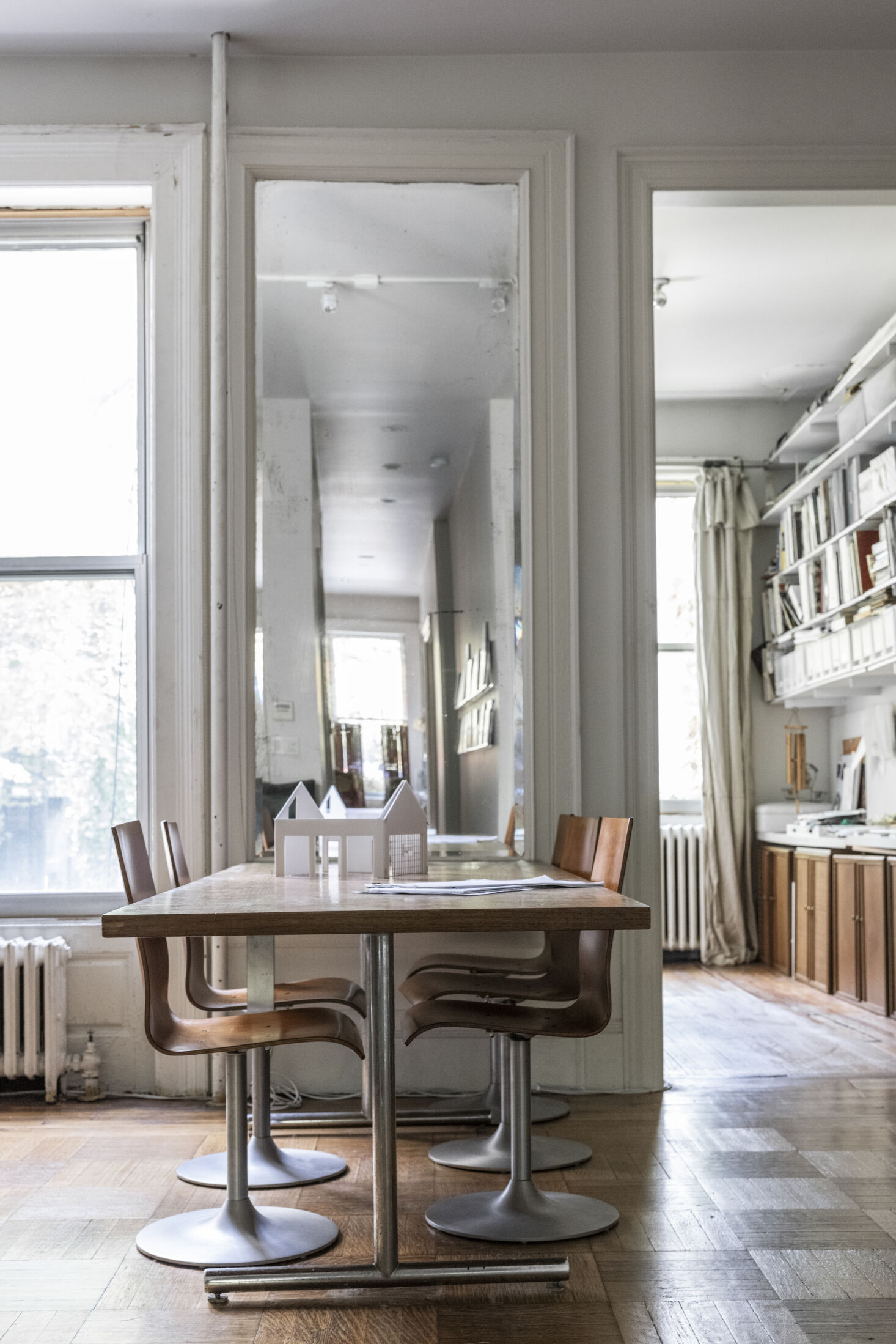 Above: Adds Maria: “We’re drawn to the power of an actual object in a way that a digital image can’t match. This is rooted in tactility—the snip of scissors, the stickiness of tape, the pressure of a pin being pushed into a board—that allows us to give more attention to something than just hearting it.” Here, a vintage conference table and chairs serves as project table, with more workspace in the alcove behind.
Above: Adds Maria: “We’re drawn to the power of an actual object in a way that a digital image can’t match. This is rooted in tactility—the snip of scissors, the stickiness of tape, the pressure of a pin being pushed into a board—that allows us to give more attention to something than just hearting it.” Here, a vintage conference table and chairs serves as project table, with more workspace in the alcove behind.
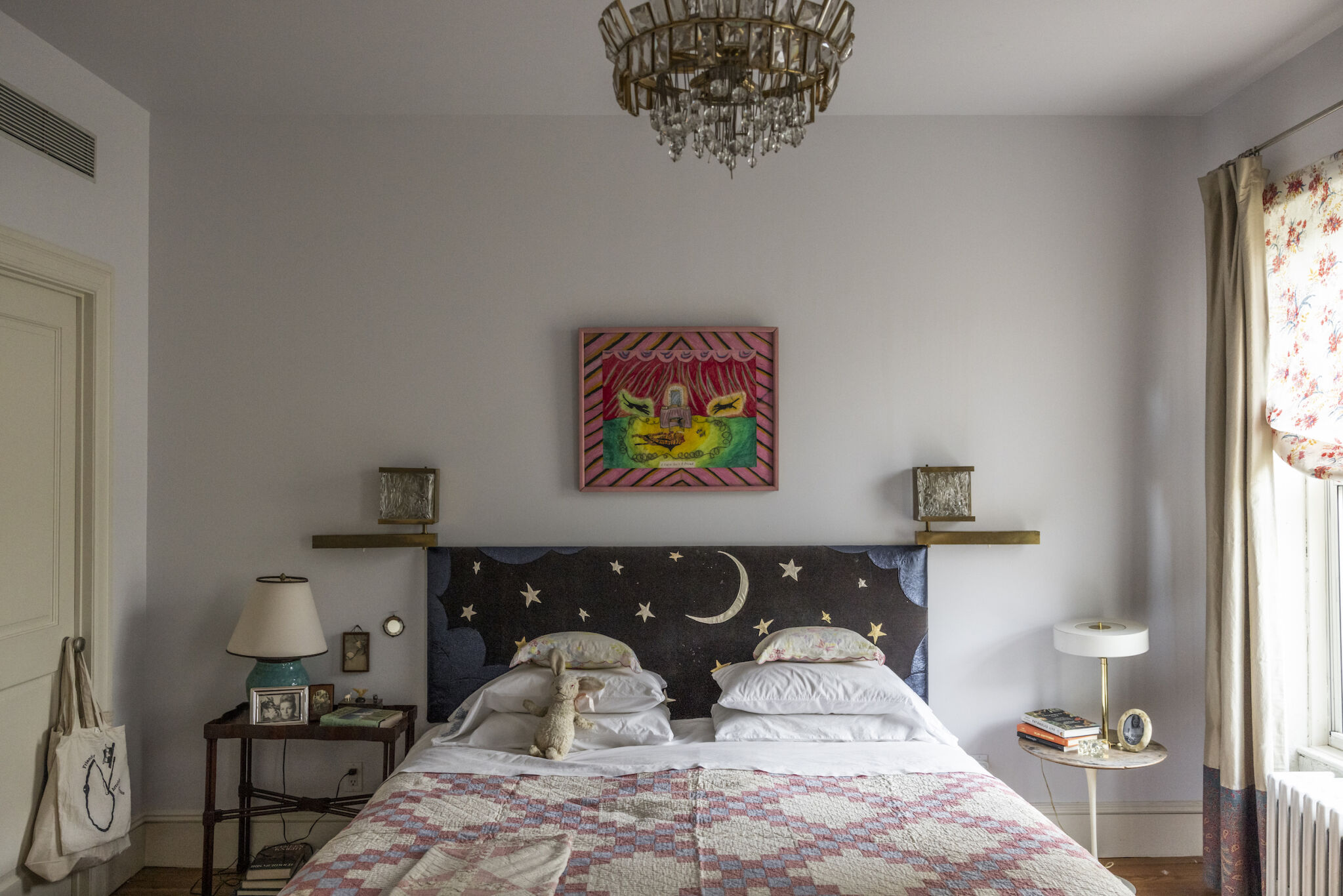 Above: “The primary bedroom is the only room that’s a different color,” writes Maria. “It’s Benjamin Moore’s Heaven, a diaphanous lavender gray. Really just a wisp of color. Years ago we chose it for a client’s bedroom, and we’ve loved it ever since. It’s especially wonderful in bedrooms because it feels like you’re waking up in a glowing cloud.”
Above: “The primary bedroom is the only room that’s a different color,” writes Maria. “It’s Benjamin Moore’s Heaven, a diaphanous lavender gray. Really just a wisp of color. Years ago we chose it for a client’s bedroom, and we’ve loved it ever since. It’s especially wonderful in bedrooms because it feels like you’re waking up in a glowing cloud.”
Maria and Brad made the star and moon headboard from metallic leather appliquéd onto velvet. “I feel we’re at our most vulnerable when we sleep, and it’s a way to incorporate the simplicity of child-like pleasures into a bedroom: soft textures, surfaces that shine or sparkle, layered with cozy worn textiles,” writes Maria. “It doesn’t aspire to grandeur or showiness, just a bunch of things that make us happy to wake up.” The painting above the bed is by Hollis Sigler: “Her work incorporates the frames into the art to create vibrant, deceptively simple imagery with dark undercurrents.”
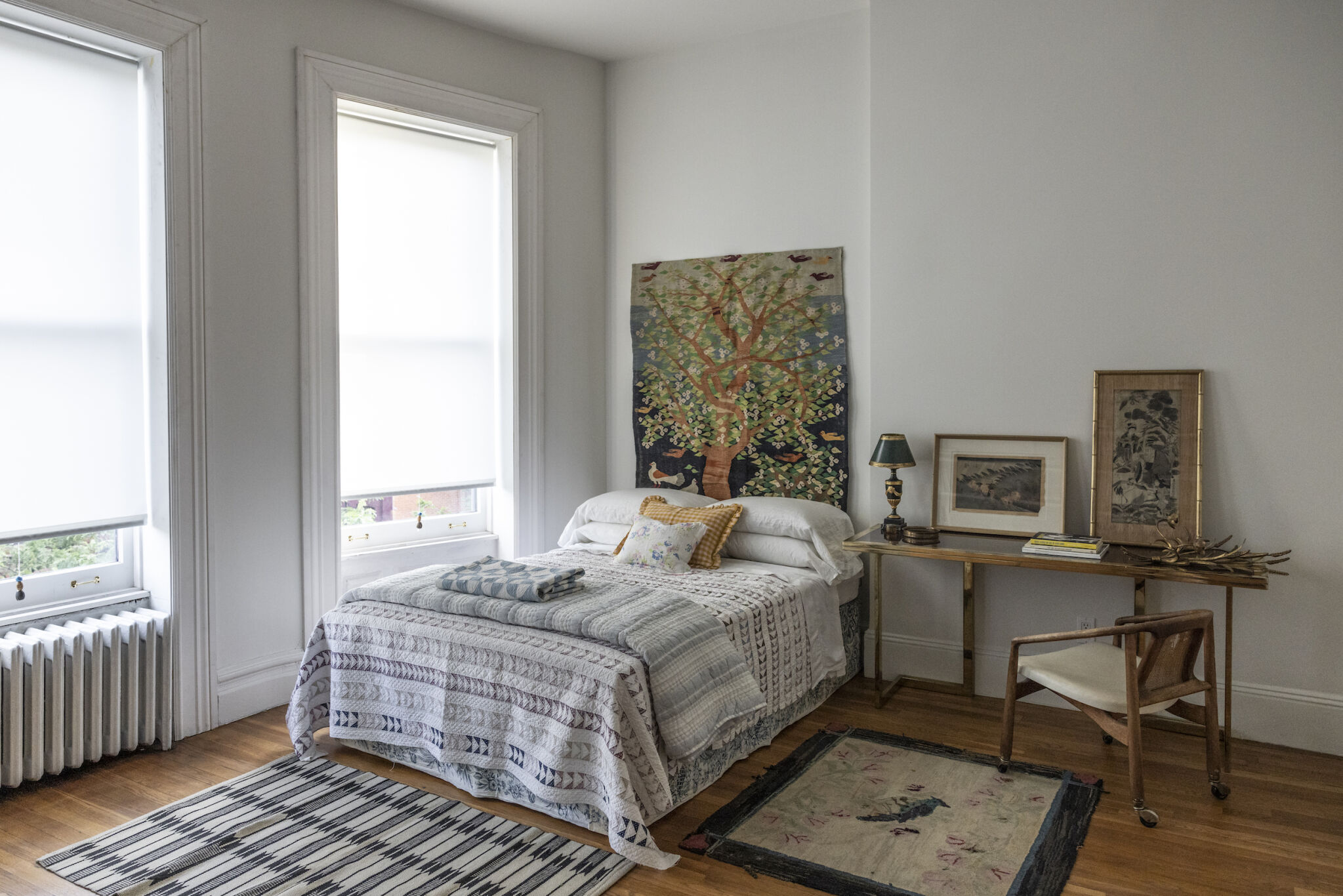 Above: In a guest bedroom, a cloth wall hanging serves as headboard. “It’s a tapestry of the tree of life, reminiscent of the incredible work of Wissa Wassef,” Maria notes. “The rugs are Scandinavian vintage and reversible.”
Above: In a guest bedroom, a cloth wall hanging serves as headboard. “It’s a tapestry of the tree of life, reminiscent of the incredible work of Wissa Wassef,” Maria notes. “The rugs are Scandinavian vintage and reversible.”
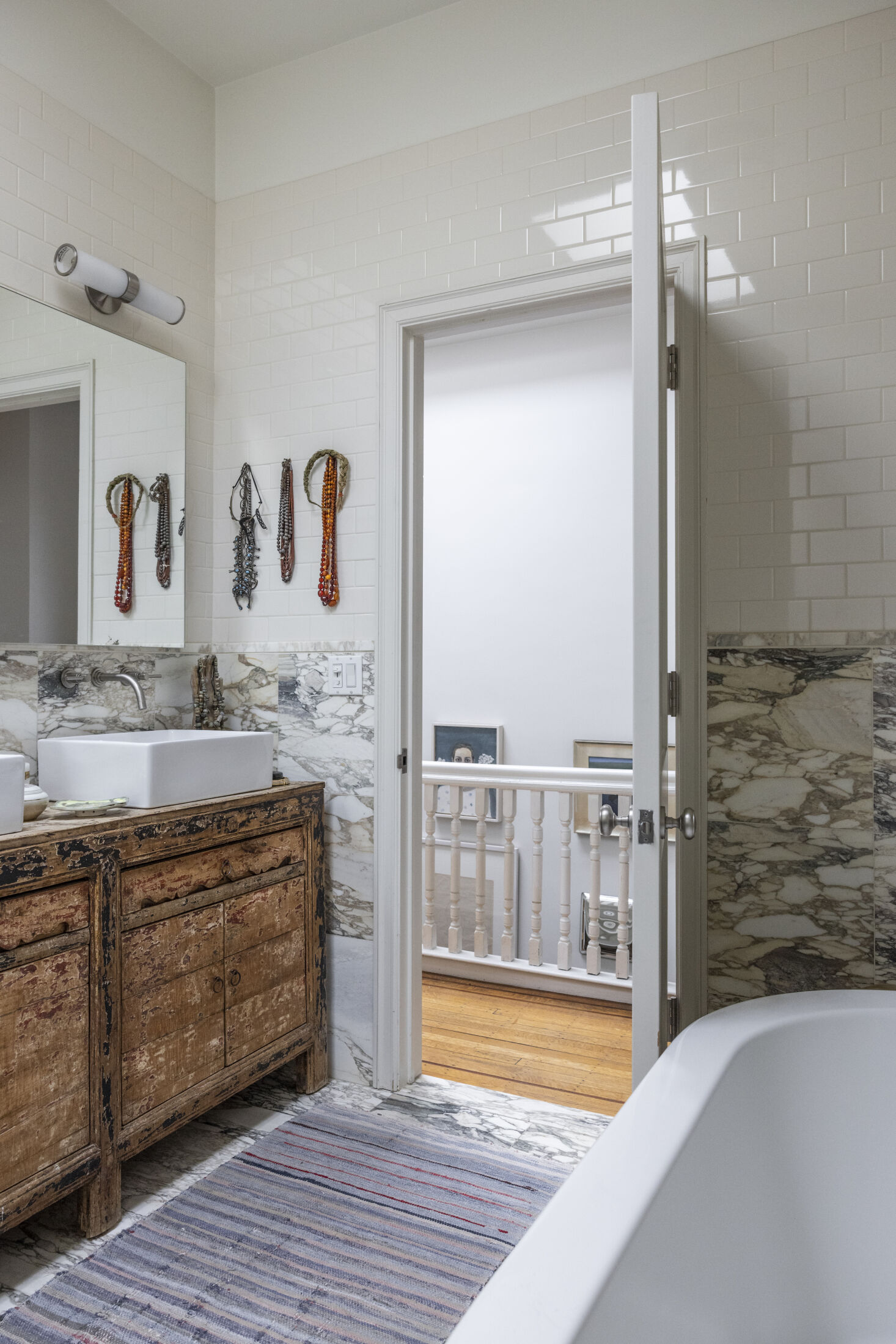 Above: The bath is a pleasing clash of textures: marble and flat-weave rug, subway tile and worn wood: “a vintage Chinese credenza repurposed as a vanity,” Maria writes.
Above: The bath is a pleasing clash of textures: marble and flat-weave rug, subway tile and worn wood: “a vintage Chinese credenza repurposed as a vanity,” Maria writes.
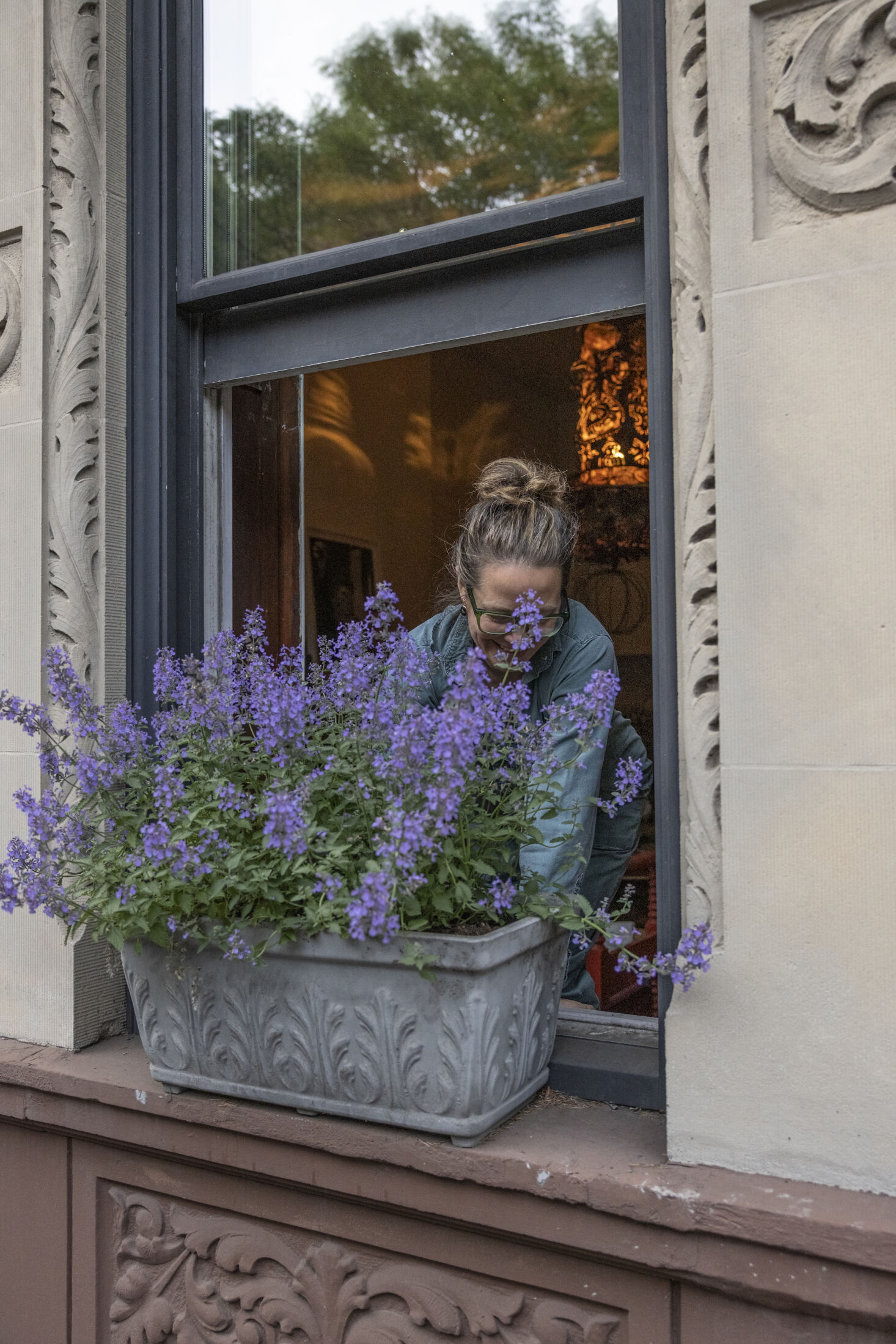 Above: Maria tends to an exuberant window box, good for privacy.
Above: Maria tends to an exuberant window box, good for privacy.
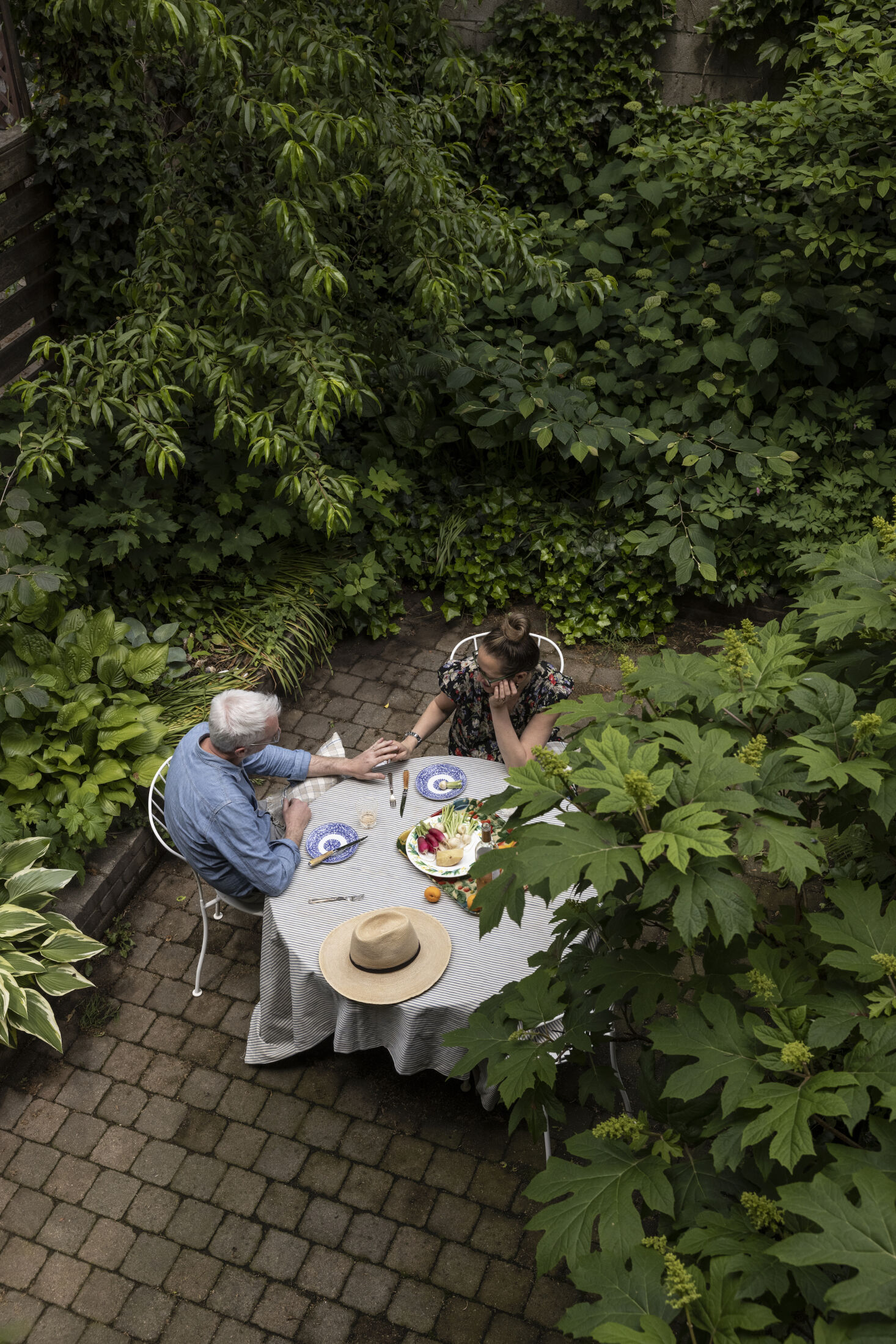 Above: The couple in their pocket-sized garden. “One of the great charms of Maine is its distance, both spatially and metaphorically, from urban life,” Maria writes. “Optimistically it’s about a six hour drive to midcoast Maine, and being in upper Manhattan certainly makes heading north easier.” When in New York, though, the row house is a bright place to call home.
Above: The couple in their pocket-sized garden. “One of the great charms of Maine is its distance, both spatially and metaphorically, from urban life,” Maria writes. “Optimistically it’s about a six hour drive to midcoast Maine, and being in upper Manhattan certainly makes heading north easier.” When in New York, though, the row house is a bright place to call home.
And for more looks at architects’ own spaces, take a look at:
- Ca’Giovanni: An Architect’s (Gentle) Renovation of His Great-Grandfather’s Work
- The Family Duplex: Architect Camille Hermand’s Combined Paris Apartments
- Head for the Hills: Two NYC Architects Design Their Own Passive House, Vipp Kitchen Included
You need to login or register to view and manage your bookmarks.

